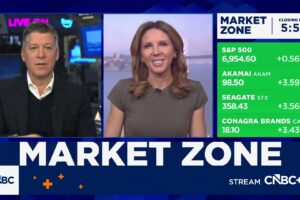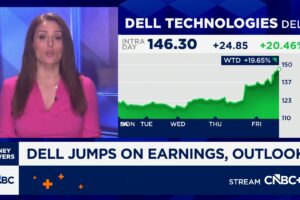
Bloomberg
ECB Doesn’t Intend Faster Bond-Buying to Mean More Stimulus
(Bloomberg) — Most European Central Bank policy makers have no intention of expanding their 1.85 trillion-euro ($2.2 trillion) emergency stimulus program despite their pledge on Thursday to step up the pace of bond buying to keep yields in check, according to officials familiar with the matter.The Governing Council’s decision to make purchases at a “significantly higher pace” over the next three months means buying debt at a faster rate than the program’s timeline suggests, the officials said, asking not to be identified. Buying would then be slowed if the economic outlook allows.The ECB’s decision came after weeks of rising yields sparked concern among some policy makers that the euro zone isn’t ready to cope with higher borrowing costs. The market shift is being partly driven by the speedy recovery in the U.S., where vaccinations have been faster and fiscal stimulus is larger than in the currency bloc.Policy makers agreed that there had been some tightening of financial conditions as a consequence of higher yields in recent weeks, though a majority of those who expressed their views also said they weren’t too concerned, according to the officials.Estonian Governing Council member Madis Muller wrote in a blog post on Friday that “the impact of rising long-term government bond yields on the economic recovery or central bank decisions should not be overestimated.” Lending rates remain very favorable for companies and individuals, he said.The pandemic purchase program is due to run until at least the end of March 2022, and has almost 1 trillion euros of firepower left. The ECB says it can be “recalibrated” — ie increased — if needed.Yields fell Thursday after the ECB’s policy statement. They reversed direction on Friday as U.S. Treasury declines weighed on European government bonds.What Bloomberg Economics Says…“After disappointing PEPP purchase data on Monday, it seemed to us that the ECB may have passed on the opportunity to respond to rising yields. Today’s action is therefore welcome.”-Maeva Cousin. To read her report, click hereGoverning Council member Francois Villeroy de Galhau, who heads the Bank of France, said in separate remarks on Friday that policy makers didn’t consider increasing the size of the pandemic program.“We simply repeated there would be flexibility if necessary,” he told Boursorama, an online bank and website. “When financing conditions are naturally favorable we can buy less. When there is a tension, we must buy more. That is what flexibility means.”The ECB will monitor financing conditions through a heat map presented at Wednesday’s Governing Council seminar, the officials said. The dashboard comprises indicators including 10-year government-bond yields, returns on bank bonds and debt of non-financial corporations, as well as bank lending rates that flash green, yellow or red depending on the level of stress.An ECB spokesperson declined to comment.Greg Fuzesi, an economist at JPMorgan Chase & Co., says the central bank could easily increase buying to 80 billion euros a month, up from around 60 billion euros a month so far this year.“That may suffice if today’s decision is seen as a credible signal to intervene and put some sort of flexible lid on market rates,” he said in a report. “The signal may be more important than the actual quantities.”(Updates with comments by Muller in fifth paragraph.)For more articles like this, please visit us at bloomberg.comSubscribe now to stay ahead with the most trusted business news source.©2021 Bloomberg L.P.











